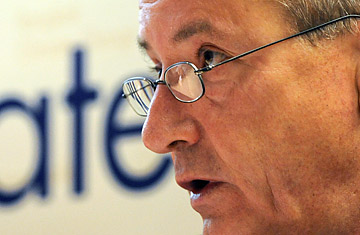
United Nations climate change chief Yvo de Boer
Yvo de Boer spends most of his time on the move, so it makes sense that he has a predilection for running metaphors. The head of the United Nations Framework Convention on Climate Change (UNFCCC), De Boer was in Bonn, Germany, over the past two weeks, helping to run the latest round of international negotiations on global-warming action, which concluded April 8. (See pictures of the effects of global warming.)
More than 2,700 delegates from 180 countries met for the talks, which are intended to set the stage for the main event: the U.N. summit in Copenhagen in December, where nations are expected to hammer out a successor to the expiring Kyoto Protocol. "If this were a marathon, I think I'd say the runners were gathering their stamina for the final sprint," De Boer told reporters on the closing day. (See the top 10 green ideas of 2008.)
But while the deadline may be getting nearer every day, the world seems to be largely running in place. The Bonn talks were the first international meeting to be attended by President Barack Obama's climate negotiators — to the palpable relief of the rest of the world that former President George W. Bush's much maligned team was gone — but on the big questions, including how to address carbon reduction in rich and poor countries, tangible progress remained elusive.
Developing countries like China pushed wealthier nations to accept tough short-term carbon emission targets, demanding cuts of at least 40% below 1990 levels by 2020. But developed nations demurred, refusing to commit to new cuts now, even though their existing commitments would lead to a reduction of only 4% to 14% below 1990 levels by 2020.
Obama's team spread good feelings and good intentions, with chief climate negotiator Todd Stern telling delegates, "We want to make up for lost time." But for the most part, the U.S. team remained passive observers. That can be chalked up to the fact that it has been on the job for mere weeks, but it's a worrying sign of how hard-pressed the international community will be if it wants to meet its deadline of creating a new Kyoto by December. "There's a lot of goodwill because [the U.S. is] back and everyone is tired of spending the last eight years in the dungeon," says Jake Schmidt, the international-climate-policy director for the Natural Resources Defense Council. "But they need to start bringing real proposals to the table and show what they're willing to do in Copenhagen."
The Bonn meetings weren't totally devoid of progress. One of the main questions facing global-climate negotiators is what should be done about tropical deforestation, since the logging and burning of trees is responsible for a fifth or more of global carbon emissions. The current Kyoto Protocol doesn't address the issue, and many — though not all — environmentalists would like to add avoided deforestation to a new global climate deal, allowing rich countries to offset some of their carbon emissions by paying tropical nations to preserve their forests. Although the idea is a controversial one — Greenpeace released a report in Bonn claiming that avoided deforestation would essentially let rich nations use it as an excuse not to make costlier emission reductions at home — a broad coalition of countries at Bonn demanded that avoided deforestation be put high on the negotiating agenda in the lead-up to Copenhagen. "They stood up and said, 'We want this,' " says Annie Petsonk, international counsel for the Environmental Defense Fund. "That's quite significant."
But on the whole, delegates left Bonn stuck in the same standoff that has all but paralyzed global climate talks over the past several years. Poor nations want rich nations to accept deep, mandatory carbon cuts, and pay tens of billions of dollars in aid to help developing countries combat global warming. Rich nations are squeamish about committing to extreme measures without help from major developing nations like China and India, which will be responsible for the lion's share of new carbon emissions in the decade ahead. And all leaders are feeling the squeeze of the economic downturn, which has shunted public attention from global warming and stalled investments in renewable-energy technologies — without which, countries won't be able to meet any emissions-reduction targets they may agree to.
In the end, it will come back to the U.S. The change in rhetoric is heartening — delegates noticed when Obama told a public audience in Prague that the world needs to tackle global warming and that "the U.S. is now ready to lead." But hopeful talk doesn't necessarily translate to numbers or action. One of the biggest topics of debate at Bonn was the draft climate-change bill released in late March by Democratic Congressmen Henry Waxman and Edward Markey, which aims to cut U.S. carbon emissions 20% below 2005 levels by 2020. That goal is significantly less ambitious than what the E.U. has pledged, but getting that bill — or anything close to it — through Congress, especially by the Copenhagen summit, will be a legislative headache.
Other nations, however, need to believe that the U.S. negotiating team can deliver on Obama's promises at home — otherwise we'll just keeping running around in circles.
